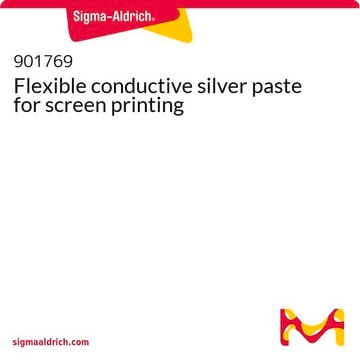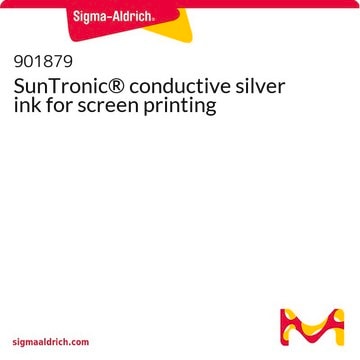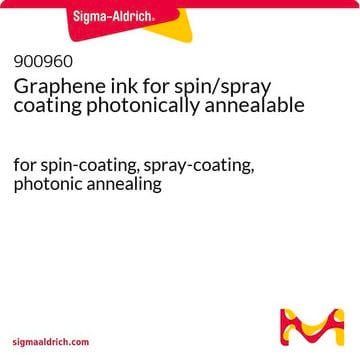901970
SunTronic® conductive graphite ink for flexographic printing
Sinónimos:
Conductive ink, Graphite/carbon ink, SunTronic® GFT4600 flexo conductive graphite ink
About This Item
Productos recomendados
description
Sheet resistance: <100 Ω/sq (flexo printed on SBS board with 18 BCM anilox roll)
Specific gravity: 1.09g/cm3
form
liquid
viscosity
1300-1700 cP (Brookfield - low shear)
storage temp.
2-8°C
General description
GFT4600 is appropriate for paper and cardboard substrates and also water-receptive polymer films and provides a unique combination of high-speed printability, fast drying, and conductivity in an easy-to-use ink system. GFT4600 can also be printed on plastic films bearing a water-receptive primer
Caution
GFT4600 is a fast drying ink that will dry to the touch between 150-300 feet per minute using standard dryers found on flexographic presses. Maximum conductivity can be achieved with further drying, inline or offline, using infrared (IR) dryers, high capacity forced hot air ovens and/or heated mandrels. Optimum drying conditions should be established for particular equipment used by the customer.
GFT4600 is supplied as ready-for-use ink. Soft sediment may occur over time so thorough mixing prior to use is necessary. The ink may be diluted with water up to 3%, however sheet resistivity will increase slightly. Dilute with caution!
The below details are only a guide, and the final choice of flexo printing specifications may depend on substrate and web speed. To achieve maximum coverage, high volume anilox rolls are recommended (80-120 lpi with 14-22 BCM).
Continuous anilox rotation is required throughout the print run to avoid ink drying on flexo plate and anilox roll. GFT4600 should not be allowed to dry completely on printing equipment. Prompt cleaning with water is highly recommended. Anilox rolls should be also cleaned using a sonicating bath after each print run.
Legal Information
Storage Class
10 - Combustible liquids
wgk_germany
nwg
flash_point_f
Not applicable
flash_point_c
Not applicable
Elija entre una de las versiones más recientes:
¿Ya tiene este producto?
Encuentre la documentación para los productos que ha comprado recientemente en la Biblioteca de documentos.
Los clientes también vieron
Artículos
Professors Tokito and Takeda share design principles and optimization protocols for organic electronic devices, focusing on flexibility and low cost.
Professors Tokito and Takeda share design principles and optimization protocols for organic electronic devices, focusing on flexibility and low cost.
Professors Tokito and Takeda share design principles and optimization protocols for organic electronic devices, focusing on flexibility and low cost.
Professors Tokito and Takeda share design principles and optimization protocols for organic electronic devices, focusing on flexibility and low cost.
Nuestro equipo de científicos tiene experiencia en todas las áreas de investigación: Ciencias de la vida, Ciencia de los materiales, Síntesis química, Cromatografía, Analítica y muchas otras.
Póngase en contacto con el Servicio técnico







